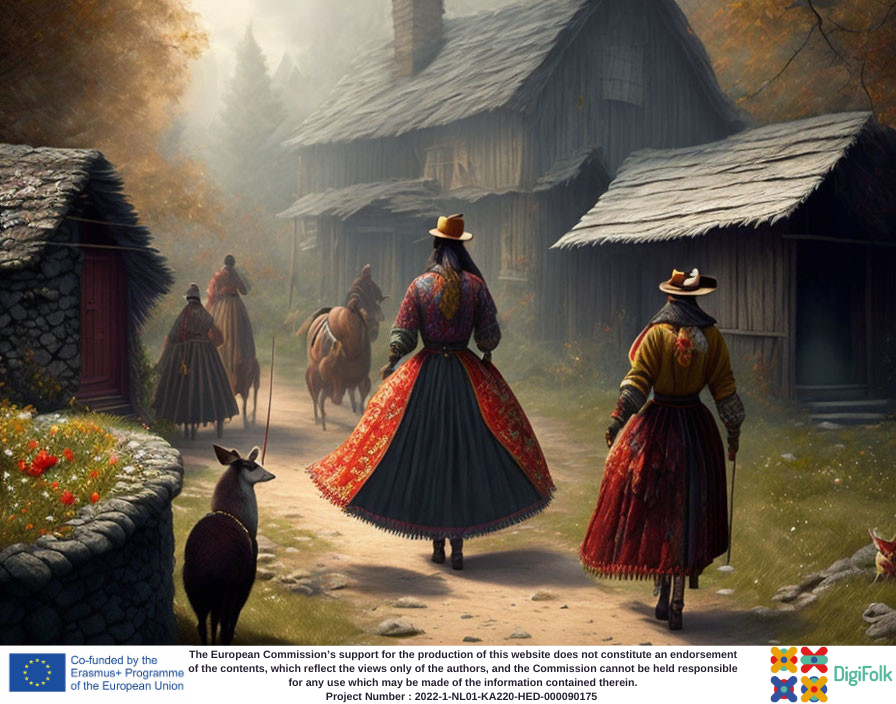
What is Folklore?
Folklore is a tapestry of human culture, woven from the threads of tradition, stories, beliefs, and customs that have been passed down through generations. It’s the living, breathing embodiment of a community’s collective memory, expressed through a variety of means like oral traditions, music, dance, legends, myths, rituals, and more.
At its core, folklore is the art of everyday people. It isn’t found in the grandeur of royal courts or the eloquence of scholarly tomes but rather in the hearts and minds of common individuals. It’s the essence of shared experiences, values, and the wisdom of a culture.
Oral tradition is a fundamental aspect of folklore. Through storytelling, songs, and proverbs, communities preserve their history, teachings, and worldview. These narratives often include myths, legends, and folktales, each contributing to the colorful fabric of a culture. For instance, Greek mythology’s tales of gods and heroes, passed down orally for centuries, are an excellent example of folklore’s enduring impact.
Folklore is not static; it’s a dynamic, ever-evolving entity. As time progresses and societies change, folklore adapts, absorbing new elements while shedding others. In this way, it remains relevant and reflects the ongoing cultural development of a community.
Folklore plays a crucial role in identity formation and preservation. It connects people to their roots, helping them understand where they come from and who they are. By engaging with folklore, individuals find a sense of belonging and connection with their ancestors, fostering a stronger bond with their cultural heritage.
In conclusion, folklore is the cultural heritage of humanity, encompassing the tales, traditions, and expressions that shape who we are. It celebrates the ordinary and the extraordinary, connecting us to our past and guiding us into the future. Whether it’s the stories told around a campfire, the songs sung at a family gathering, or the customs followed during a festival, folklore is an enduring testament to the richness and diversity of human culture.
References:
- Dundes, A. (1965). The study of folklore. Prentice-Hall.
- Abrahams, R. D. (1968). Toward an ethnography of folklore. Western Folklore, 27(1), 1-15.
- Tokumaru, Y. (2010). The dynamic nature of folklore: Theoretical discussions and case studies in Japan. Asian Ethnology, 69(2), 205-221.
- Dorson, R. M. (1978). Folklore and folklife: An introduction. University of Chicago Press.
- Dégh, L. (2001). Legend and belief: Dialectics of a folklore genre. Indiana University Press.
Evropska komisija podržala je kreiranje ove internet stranice, ali nije odgovorna za njen sadržaj, koji izražava isključivo stavove autora. Komisija nije odgovorna za korišćenje informacija prezentovanih na internet stranici.
Avrupa Komisyonu'nun bu web sitesinin hazırlanmasına verdiği destek, sadece yazarların görüşlerini yansıtan içeriklerin onaylandığı anlamına gelmez ve Komisyon burada yer alan bilgilerin herhangi bir şekilde kullanılmasından sorumlu tutulamaz.
The European Commission’s support for the production of this website does not constitute an endorsement of the contents, which reflect the views only of the authors, and the Commission cannot be held responsible for any use which may be made of the information contained therein.
Η υποστήριξη της Ευρωπαϊκής Επιτροπής για την παραγωγή του παρόντος δικτυακού τόπου δεν συνιστά έγκριση του περιεχομένου, το οποίο αντανακλά τις απόψεις μόνο των συντακτών, και η Επιτροπή δεν μπορεί να θεωρηθεί υπεύθυνη για οποιαδήποτε χρήση των πληροφοριών που περιέχονται σε αυτόν.
De steun van de Europese Commissie voor de productie van deze publicatie houdt geen goedkeuring van de inhoud in die alleen de mening van de auteurs weerspiegelt, en de Commissie kan niet verantwoordelijk worden gehouden voor enig gebruik dat van de informatie in deze publicatie wordt gemaakt.
Project Number: 2022-1-NL01-KA220-HED-000090175